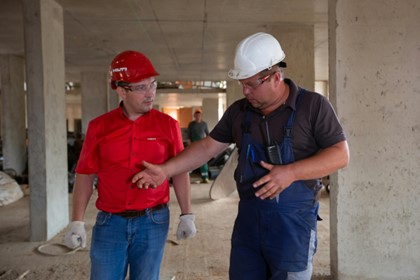Construction Workforce Development: Training Soft Skills in Hard-Hat Environments
July 14, 2025

Soft skills are non-technical skills related to problem-solving, effective communication, and teamwork. In the construction industry, soft skills are crucial in how teams navigate challenging situations, adapt to rapidly changing environments, and ensure the safety of their teams on the job. While they may not seem like the typical construction industry skills, they are increasingly important.
Modern construction work depends on soft skills more than ever. A Deloitte study finds that, based on growth from 2019 to 2023, soft skills such as people management are in demand, with 76.5% of survey respondents stating that it is one of the fastest-growing major skill sets in the industry. Soft skills keep projects moving forward and employees engaged.
Current State of the Construction Industry and Construction Workforce
Workforce development remains a critical, ongoing requirement across the construction industry. While workforce training programs continue to focus on digital skills and enhancing leadership abilities, the importance of soft skills is growing. The construction industry continues to face a shortfall of employees, with a projected need for approximately 439,000 workers in 2025 alone.
Some of the ongoing challenges faced by the construction industry in regards to soft skills include:
- Difficulty assessing a person’s soft skills from a resume. Unlike hard skills, which can be easily demonstrated through certification, assessments require interviewing and behavioral-related questions. These are more subjective.
- Not everyone’s idea of good communication or positive soft skills is the same. That could lead to differences in leadership expectations and outcomes. It also creates inconsistencies as they relate to assessing new talent.
- There is also less emphasis on selecting a professional with strong soft skills over technical skills. When limited applications in some areas, companies prioritize those with valuable hard skills over soft skills when forced to make a decision.
What happens when communication in construction isn’t effective? What challenges do companies face when there’s a lack of teamwork in construction? A lack of hiring or training in soft skills creates numerous obstacles, including:
- A lower level of productivity. Teams that work together are more productive.
- More mistakes on the jobsite (and the budget). With teams that are better aligned and communicating, there’s less time spent redoing mistakes.
- Project delays. Better project management leads to positive outcomes. Teams that communicate more effectively achieve greater success, keeping timelines on track.
The Value of Soft Skills in Construction Environments
Effective construction teams can work together to achieve goals. When they have soft skills, there are numerous potential benefits, including:
- Enhanced communication and teamwork. This leads to improved project success rates, as well as increased overall team satisfaction.
- Improved construction site safety. Better communication means that safety protocols and compliance requirements are met.
Implementing Soft Skills Training
To enhance outcomes with construction work, build effective workforce training programs that incorporate soft skills. To achieve this within your current workforce development program, focus on:
#1: Identifying the key soft skills necessary for construction success
Soft skills may include:
- Communication
- Teamwork and collaboration
- Stress management and mitigation
- Leadership skills
- Time management
- Adaptability and flexibility
- Problem solving
- Customer and project awareness
#2: Developing or investing in programs that enhance training in soft skills
Work to build soft skills training methods that are digital, hands-on, or through workforce development programs. Seek out programs with specific construction industry programs.
#3: Overcoming resistance and measuring success
Having a robust program in place for training soft skills may be critical, but it's challenging to keep employees engaged when they have a long list of tasks to manage. If employees push back, consider offering incentives to those who complete their educational programs. Work to measure success through improved operations and communication within the company.
Partnering With Temp Staffing Agencies
Temp staffing agency benefits are numerous, but you may not know that companies like ours work closely with employees to build those critical soft skills your business needs and will benefit from, and that can be valuable in employee development in construction companies.
Additionally, when you choose the right staffing partner and communicate your needs for both soft skill training methods and development.
A well-rounded workforce, equipped with both soft skills and critical hard skills, fosters success within your organization. It helps your team grow and ensures ongoing success in construction management.
Getting Started With Soft Skills in Construction Work
Construction work is not just about hard skills and technical abilities. Hiring team members with soft skills is just as important. You can achieve more by partnering with a workforce development program that meets employee needs. Partner with a company that can help you with construction candidate vetting.
Contact HireQuest now to learn more about services that help construction companies fill critical roles.







